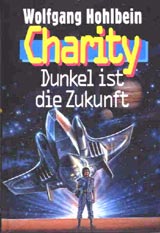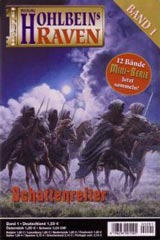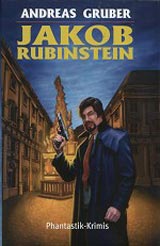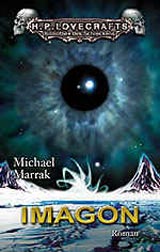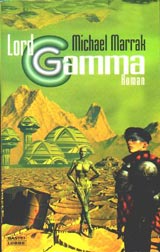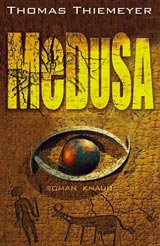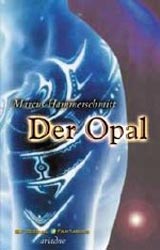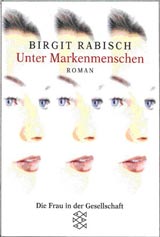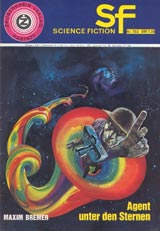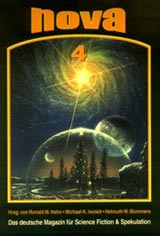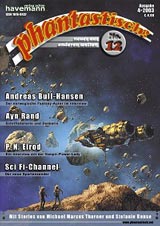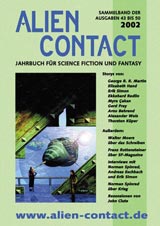The beginnings of German Science Fiction It is difficult to pinpoint the exact year when the history of Science Fiction started in Germany, but a very likely candidate is the year 1897, when the german philosopher Kurd Laßwitz published his original novel "Auf zwei Planeten" ("On two planets"). Kurd Laßwitz, holding a PhD in physics and teaching mathematics in secondary schools, had created one of the most popular utopian novels of his time. Very soon it was translated and published in other countries, and in 1930, when it was banned (with all the other utopian literature) by the Nazi regime, it had sold over 70.000 copies worldwide!
In Germany, the utopian literature genre (what we call SF today) took a new start after World War II. While a lot of pre-war SF was heavily influences by the classical fantastic works of authors like Franz Kafka or the scientifical visions of men like Kurd Laßwitz and Hans Dominik, the post-war SF often just seemed to be a slavish imitation of the American short stories, that had been published in german translation since the early 1950s. With the loss of so many authors during the war, it seemed that the German fantastic literature also lost its own identity.In the 1950s and 1960 SF and Fantasy literature could only be found in inexpensive, pulp-like magazines, filled with translated short stories from US magazines, like Analog and Galaxy. German authors, who wanted to be a part of the renaissance of SF in Germany, mostly sold their stories using English-sounding pseudonyms.
Therefore, in order to be able to sell their stories to the german magazines, they tried to imitate the style of US authors. As german publishers saw the market for SF and Fantasy literature in their own country, they developed a new idea: They hired a selection of authors and were such able to fill their magazines with serial SF each week.
Upon this development, Walter Ernsting (pen-name Clark Dalton) and Karl-Herbert Scheer in 1961 created what is now called the most extensive Science Fiction series of the world - Perry Rhodan. Up to today every week brings a exciting new adventure of Perry Rhodan in Germany and also in other countries worldwide (including France, the Netherlands, Czech Republic, Brazil).The situation changed dramatically in the 1970s and 1980s. Probably because of the huge success of the original Star Wars movie trilogy, SF short stories and novels started selling very well in Germany. So far only a handful of german authors, like Herbert Franke, had managed to see their novels printed and if so only in paperback editions. However, starting with the SF boom in the 80s suddenly it was much easier for german SF authors to sell their novels and get published.
Yet, the german author community seemed not to be ready for this new era - only a handful of writers used this opportunity well, and unfortunately the quality of lots of SF literature published in these days is debatable. The autors, who had the imaginative talent to invent new worlds, interesting cultures and exciting space adventures (that is what SF is about after all) soon used their skills to write e.g. historical novels, a category of literature which sold even better. And when the rise of SF publications ended as suddenly as it had started, ‘german SF’ again stood mostly for (the still popular) serial SF, a weekly return to endless space opera stories…
The Eschbach-Phenomenon
After the crisis in the SF market in the late eighties, everybody was sure that, being an author in Germany it is not possible to write SF for a living. Optimists always put successful fantasy writer Wolfgang Hohlbein forward. He also published some SF novels, but he foremost specializes in writing for a juvenile readership.
However, against all odds, german author Andreas Eschbach proved, that a good SF novel, that, moreover, also appeals to the non-SF reader, can become a real bestseller! Not even established as an author, Andreas Eschbach, managed to get his first novel, a SF book, titled "Die Haarteppichknüpfer" ("The Carpetmakers") published as a Hardcover (!) in 1995.
Andreas Eschbach abode the SF genre and his novel "Jesus Video" again was placed on the top of the bestseller lists. Eventually, it was also turned into a script for quite a successful TV mini-series for a German TV network. Andreas Eschbach’s novels have been translated into different languages and published in France, Japan, Italy, Czech Republic, Russia and also in the USA!
Sure enough he became the archetype of a successful german SF writer and still inspires a lot of amateur writers, who dream of becoming equally famous. But if we can learn one thing from Eschbach’s success it is that you really have to work hard, to become a good and in the end also a bestselling SF writer!
Getting published
Let’s talk some numbers first - about 15 novels and over 50 short stories were published in the SF genre in Germany in the last year (2003). Those numbers do not include the 52 pulp-style novels of the weekly SF series PERRY RHODAN (with actually more than ten staff authors). This is aside from the fantasy market which totals nearly ten novels, even though no short stories
Even though the numbers seem to indicate that it is easier to publish short stories that is not how reality looks like. Authors who want to get their work printed today find it much easier to get a novel published (even if it's only with small publisher), than a short story. It seems that even the formerly good selling anthologies with translated international stories (out of American magazines such as “Asimov’s” and "Magazine of Fantasy and Science Fiction") did not live up to their expectations. As a natural consequence the big publishers cancelled the publication of those series.
But what if you still want to publish a short story in Germany? There are some periodicals which could fill the gap for short story authors. The bi-weekly computer magazine “c't” publishes short stories dealing with computers (and there could be a computer in any SF short story!). As an author, you can also try to get published in one of the few quarterly genre print magazines ("Nova" or "phantastisch!") and, after all, in the days of internet there is always the option to place a short story in one of the semi-professional online SF magazines. However, out of these publications, only "phantastisch!" pays a small fee to the writer, so professional SF authors soon decide to quit writing short stories and concentrate on writing novels and, maybe, earn enough money for a living.For someone who wants to debut as a SF writer, the publication of short stories is a good initial start. An alternative way to professional magazines is to publish in one of the many unedited amateur SF fanzines. However, the best advice for new authors that are enthusiastic to learn a lot more about writing and, furthermore, obtain professional counsel, is to attend a SF author workshop.
Today, there are two good workshops for German SF writers - one is in northern Germany, the other one in Austria. Both have attracted successful authors as tutors and both meetings are known to result in the publishing of good SF stories. Some authors (like Andreas Gruber) have been attending these workshops now for some years and have since successfully released their first story collection or even their first novel by a independent small publisher.
Unfortunately, to get your own novel published by one of the big publishing houses, like the german division of the american Random House or the native-german publisher Bastei-Lübbe is a lot more complicated. Thus, only a handful of german SF writers are figureheads for the SF section of those publisher, among them Andreas Eschbach, Michael Marrak, H.D. Klein or Thomas Thiemeyer.Akin to SF is the genre of fantasy (the are most often combined to be fantastic literature). Publishing in the fantasy section seems to be a little easier with fantasy, because some publishing houses have started new fantasy imprints. The range of the contemporary german fantasy spans mass-market novels that (after the successful movies) freeride on the Tolkien-mania or are simply adapted Role-Playing-Game Novels and, fortunately, original quality novels. German editors are predominantly looking for German authors – basically because it saves a lot of money to publish a native author.
Publishing foreign works not only requires a good translation, the publisher also has to fight and pay for the rights of the foreign work. Because the market for fantasy novel is a larger one, lots of beginning authors start writing a fantasy novel and when their manuscript reaches 1.000 pages, they try to place their manuscript with one of the publishing houses. And if the publisher is in need of a fantasy novel this procedure really works. The trade-off is clear enough – the quality of those novels is not what the interested reader wants and in the long-run German fantasy complies with the bad picture it already has.Certainly it is not the easiest of all careers to become a SF or Fantasy author in the german speaking countries. But if you bring the skills of a good writer and have the power to keep up with all the defiances there is a fair chance that you get a novel published by a big publishing house. This might also mean that you have a future as a SF and/or Fantasy writer. And never forget that all the fans out there will welcome your efforts.
Florian Breitsameter
German fandom in a nutshell
(Info provided by Florian Breitsameter)
Fandom born: West-German fandom was born in the early 1950's. The first German sf club (and still existing), the "Science Fiction Club Deutschland e.V." was founded in 1955.
First con organized: According to historians of German fandom, the first German sf-cons took place in the fifties. In 1969 the was even a WorldCon in Heidelberg! Most important current sf cons: "Dort.Con" in Dortmund (www.dortcon.de), takes place every two years, "ElsterCon" in Leipzig, very good con with international guests, ColoniaCon, in Cologne, also takes place every two years. Addition to them there are also some small cons arranged by German sf clubs.
Other activities: Big fantasy fandom, a lot of rolepaying activities, as well as Star Trek and Star Wars fans.
Sf/f awards: Deutscher Science Fiction Preis – DSFP (German sf award, the most important of the German sf awards for German sf, the winner is selected by a jury of the members of the SFCD), Kurd-Lasswitz-Preis (prize for german sf and international sf published in Germany, only the German sf professionals are allowed to vote), Wetzlarer Phantastik-Preis (award for phantastic literature from the German town Wetzlar that has an own library only dedicated only for sf). Addition to that there also some internet awards (for example Deutscher Phantastik Preis) but their importance is much smaller.
Most important sf/f clubs etc.: SFCD e.V. : Science Fiction Club Deutschland (the oldest German sf club, founded 1955), Perry Rhodan FanZentrale: PRFZ (a club for the fans of the german series Perry Rhodan), ACD: Atlan Club Deutschland (a small fannish club, founded ca. 1981), PRBCBS: Perry Rhodan Briefclub Bullys Schreibtisch (a small fannish club, founded 1978, FOLLOW - Fellowship of the Lords of the Land of Wonder (a fantasy and roleplaying club). Also numerous Star Trek clubs.
Sf/f magazines and fanzines: phantastisch! (published quartely, national and international authors), Nova (published quartely, national and international authors), Fandom Observer (monthly infozine, print and online version). Addition to that lot of smaller zines.
Webzines, websites etc.: SF-Fan.de (www.sf-fan.de, the number one German sf site, founded 1997, news, reviews, stories,), Phantastik.de (www.phantastik.de, newssite with reviews and more), Alien Contact (www.alien-contact.de, an internet magazine)
Novelists and short story writers: Andreas Eschbach (the most famous one, has also been published in France, Japan, Italy and soon also in the USA), Michael Marrak (soon also in France), Marcus Hammerschmitt, Barbara Slawig, H.D. Klein, Birgit Rabisch, Wolfgang Jeschke, Wolfgang Hohlbein (mostly fantasy), Andreas Gruber (Austrian), Oliver Henkel Addition to that there also the authors of some novelette series like Perry Rhodan: Robert Feldhoff, Arndt Ellmer, Rainer Castor, Manfred Weinland, Michael Marcus Thurner, Achim Mehnert, Uschi Zietsch, Leo Lukas and many more.


